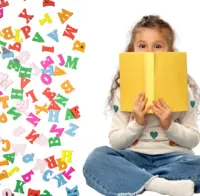As children begin their journey of literacy, they are introduced to the building blocks of language – letters, sounds, and words. While these are crucial in learning to read and write, there is one aspect that often goes overlooked, vocabulary. This refers to the words that children use and understand in their daily lives. Vocabulary playa a vital role in their overall language development. Unfortunately, there is a significant gap in vocabulary among children today, leading to struggles with reading comprehension and academic success. Let’s delve into the importance of primary vocabulary and how addressing this gap can help children become more eloquent and proficient readers.
Vocabulary words are the building blocks of language and have a significant impact on a child’s overall language development.
Why is vocabulary so important in literacy development? The answer lies in its connection to reading comprehension. Vocabulary is essential for understanding and interpreting texts. When children have a vigorous vocabulary, they are able to grasp the meanings of words and make connections between words and concepts. On the other hand, a weak vocabulary can greatly affect comprehension, leading to difficulties in understanding what is being read.
Unfortunately, many children today are facing a significant vocabulary gap. They are lacking exposure to a wide range of words and are not receiving adequate vocabulary instruction. This gap has a direct impact on their reading comprehension and academic success. To address this issue, it is crucial to implement strategies that enhance vocabulary learning in children. By focusing on vocabulary instruction and providing ample opportunities for children to engage with words, we can help them become more eloquent and proficient readers.
By explicitly teaching vocabulary, we empower children to expand their word bank and develop a robust vocabulary. When children have a wide range of words at their disposal, they can understand and express themselves more eloquently. They become better equipped to comprehend complex texts, make connections between words and concepts, and draw upon their knowledge to infer meaning.
The transformative power of focused vocabulary instruction lies in its ability to unlock a child’s potential as a reader and communicator. It gives them the confidence and skills they need to tackle challenging texts, participate in meaningful discussions, and express themselves effectively in both spoken and written forms. With a strong vocabulary foundation, children can navigate the world of language with ease and become proficient and confident readers.





